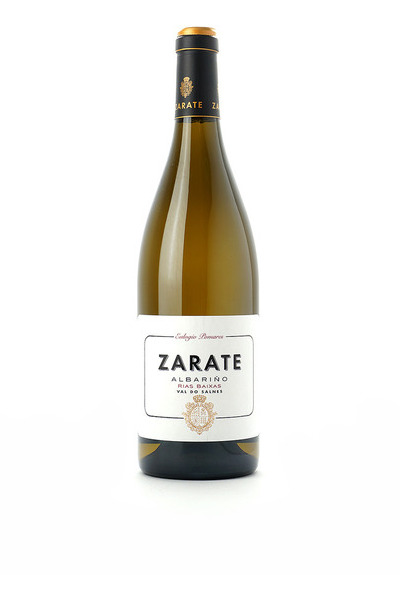Close
Bodegas Zarate Albarino – Rias Baixas
Spain

- Brand: Bodegas Zarate
- Categories: Albarino, White Wine
- Sweet-Dry Scale: Dry Wine
- Features: Organic
COUNTRY
Spain
REGION
Rias Baixas
APPELLATION
Rias Baixas
WINE TYPE
White
VARIETALS
Albarino
ORGANIC
Practicing
BIODYNAMIC
Practicing
VINEYARD
All the vineyards are in the granite-rich soils of Val do Salnes.
SOIL
Granite
There were only thirty wineries in Galicia’s Rias Baixas when it officially attained appellation status in 1988, and almost all the wine they produced was consumed locally. Also, in fact, at the turn of the last century, 95% of the wine produced in Riax Baixas was red, not white!
In the years since then, Rias Baixas has exploded, now home to six times as many producers, and driven by a worldwide thirst for the bracingly fresh and aromatic white wines made from the region’s signature grape, Albariño.
Most producers are content with making refreshing wines—for drinking young—to meet that demand. Yet, there are growers with much higher aspirations, and none more so than the one that pioneered high-quality Albariño in the mid-20th century: Bodegas Zarate.
Setting the Bar
It was in 1953 that Ernesto Zarate initiated the Albariño Festival in the region’s capital of Cambados. He withdrew his wine from the festival’s competition three years later having won first prize each year, vowing not to re-enter until another grower had matched his accomplishment. To this day, none have.
Today, it is seventh-generation Eulogio Pomares at the helm of this historic bodega, and he is even more quality-driven than his predecessors. As he told Food & Wine’s Ray Isle, “the problem with Albariño is that the message has been 'drink young, drink young, drink early, drink young' for the last 20 years. But the best thing with Albariño is to make wines that last."
Through an estate blessed with old vines, great terroirs, and his own perfectionist approach, Pomares does just that; making Albariños that may not only be the best white wines of Galicia, but potentially in all of Spain.
Yet, Eulogio’s brilliance isn’t limited to Albariño— he has also been instrumental in the recovery of Galicia’s once dominant red varieties. His tiny productions of Espadeiro, Caiño Tinto and Loureiro Tinto rank with Galicia’s finest, and have developed their own intense cult followings.
Ancient Vines
The Zarate estate is an old one, founded in 1707. Formed by the lower reaches of the Umia River, its undulating slopes of Xabre—weathered granite— soil, and cool climate make Val do Salnés the region’s greatest terroir and home to its longest lived wines.
Here Pomares farms Rias Baixas’ oldest documented Albariño vineyard—the pre-phylloxera El Palomar, planted in 1850—and the estate boasts ancient Loureiro Tinto and Caiño Tinto vines as well. But even the wines from Zarate’s younger plantings boast uncommon depth, richness and age- worthiness due to the estate’s great terroirs and Eulogio’s uncompromising focus.
The range begins with the fresh, balanced and very mineral Zarate Albariño, sourced from vines averaging 35-years-of-age primarily from the estate’s Ribadumia section. The wine spends 6 months on its fine lees, and 10-25% can go through malolactic fermentation, depending on the year.
While the Zarate bottling ranks among Rias Baixas’ elite on its own, it is Eulogio’s special bottlings that have taken Albariño to an entirely different level.
Early on, he recognized the unique characters of three sub-crus and, over time, he has refined them into three utterly singular expressions.
Tras da Viña comes from a vineyard planted in 1970 with cuttings from El Palomar. The soil is derived from a decomposed, yellow granite, and it is richer than the other sites. Eulogio leaves the wine on its lees for 30+ months to add textural weight, and a portion usually passes through malo. This may be the most Chablis-like of the three cuvées, and is generally the most accessible at release.
Balado is produced from two parcels of ungrafted vines, planted in the 1950s, in a south-facing, granite-walled vineyard (“Balo” in Gallego). Balado spends longer on the lees than Zarate, and the malo is usually blocked, but its familial resemblance is striking. In fact, Balado tastes like the ultimate extension of classic Albarino – more intense, more profound, more precise.
El Palomar is an ungrafted vineyard believed to have been planted in the 1850s.
The soils are poor, and barely cover a very hard granite. The wine is aged in a single, large neutral barrel for 6 months, and does full malolactic fermentation. The wines show a different, redder fruit, and the vine’s great age make for an Albariño of incredible depth, nuance and subtlety.
In addition to the whites, Eulogio is fashioning tiny amounts of classically fresh and elegant—yet deep and rich—Espadeiro, Loureiro Tinto and Caiño Tinto. Red wine once defined Val do Salnés’ production, and Eulogio is working tirelessly to restore this important legacy with new massale plantings from the remaining pre-phylloxera vines.
The reds receive a month-long fermentation/maceration in open top oak vats with daily punching down of the cap. They then age for a year in large barrel, where they complete malolactic fermentation.
Naturally Expressive
As remarkable as the high quality and originality of Eulogio’s wines are, the most extraordinary aspect to his approach is his use of natural viticulture, a seemingly impossible feat in what is perhaps Spain’s coolest and wettest winegrowing region.
In fact, Pomares’ farming is almost fully biodynamic—he works the soil manually, uses cover crops, and makes his own herbal “teas” for vine treatments. All new plantings are massale selections from the estate’s oldest vines. And, of course, fermentations proceed with only the indigenous yeasts. c
Shop
Volume
Price
Go to Shop

Reviews